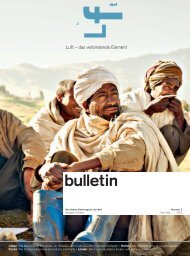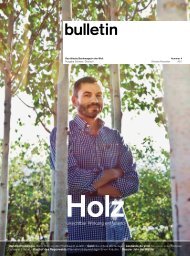Security & Conflicts
Global Investor Focus, 02/2006 Credit Suisse
Global Investor Focus, 02/2006
Credit Suisse
Create successful ePaper yourself
Turn your PDF publications into a flip-book with our unique Google optimized e-Paper software.
GLOBAL INVESTOR FOCUS <strong>Security</strong> & <strong>Conflicts</strong> — 34<br />
Photo: Johannes Kroemer<br />
Michael Klare is Professor of Peace<br />
and World <strong>Security</strong> Studies at Hampshire<br />
College in Amherst, Massachusetts.<br />
He is the author of “Resource Wars:<br />
The New Landscape of Global Conflict”<br />
(2001) and “Blood and Oil: The Dangers<br />
and Consequences of America’s<br />
Growing Dependency on Imported<br />
Petroleum” (2004). see full biography on page 70<br />
them involving energy reserves in the Red Sea, the South China<br />
Sea, and the Gulf of Guinea, could ignite significant armed conflict<br />
in years to come. Conflict could also arise over efforts to transport<br />
oil and gas supplies in the face of internal or regional conflict. In<br />
Iraq, for example, American forces are deeply involved in efforts to<br />
protect pipelines, pumping stations, and refineries against insurgent<br />
and criminal violence. Recurring attacks on these facilities<br />
have severely hampered the nascent Iraqi government’s efforts to<br />
use oil exports to finance economic reconstruction – an absolute<br />
necessity if the government is to attract any popular legitimacy –<br />
and so US officials have made protection of oil installations a high<br />
military priority.<br />
Conflict could also arise in the case of threats to the safe passage<br />
of oil tankers through key maritime “choke points,” such as the<br />
Strait of Hormuz near the Persian Gulf and the Strait of Malacca<br />
near the Indian Ocean. Every day millions of barrels of oil travel by<br />
tanker through these narrow passageways, carrying Persian Gulf<br />
oil to markets around the world.<br />
For some considerable time the US has made it clear that it will<br />
not tolerate any effort by a hostile power to close these corridors<br />
and thus impede the global flow of oil. In the most famous expression<br />
of this policy, then President Jimmy Carter declared in January<br />
1980 that any move to block oil traffic in the Persian Gulf would<br />
be regarded “as an assault on the vital interests of the United<br />
States of America” to be repelled “by any means necessary, including<br />
military force.”<br />
Escorting oil around the world<br />
More recently, American officials have expressed their determination<br />
to prevent Iran from blocking the Strait of Hormuz, an action<br />
that Tehran has threatened to take in retaliation for any US military<br />
strikes on Iranian nuclear facilities. The United States has also<br />
stepped up its naval patrols in waters off Nigeria, where ethnic<br />
militias and criminal gangs have seized offshore oil facilities and<br />
coastal oil tankers. These are by no means the only places or situations<br />
in which the competitive pursuit of oil and natural gas could<br />
lead to armed conflict between competing nations, factions and<br />
groups. And while oil and gas are the commodities most likely to<br />
spark resource conflict in the years ahead, they are not the only<br />
materials that could trigger armed violence. The risk of such conflict<br />
can only grow, moreover, as soaring worldwide demand encounters<br />
ever-shrinking supply, and as more and more states (and<br />
other actors) turn to armed combat to deal with the specter of<br />
scarcity. Unless something meaningful is done to address this predicament,<br />
we can expect an increasingly dangerous epidemic of<br />
resource wars.<br />
To reduce this danger, the international community must address<br />
both sides of the equation: it must seek to reduce demand<br />
through vigorous conservation, while increasing supply through<br />
technological innovation and the development of substitutes for<br />
scarce materials. At the same time, however, we must repudiate<br />
the ideas put forward in the “Carter Doctrine” and other precepts<br />
that legitimize the use of military force to address resourcescarcity<br />
problems. In particular, the international community needs<br />
to rise to the challenge of developing a more robust system of law<br />
and adjudication for resolving territorial disputes such as those<br />
described above. The greater the progress we make in these areas,<br />
the smaller the risk that the 21st century will be a time of endless<br />
resource wars.

















